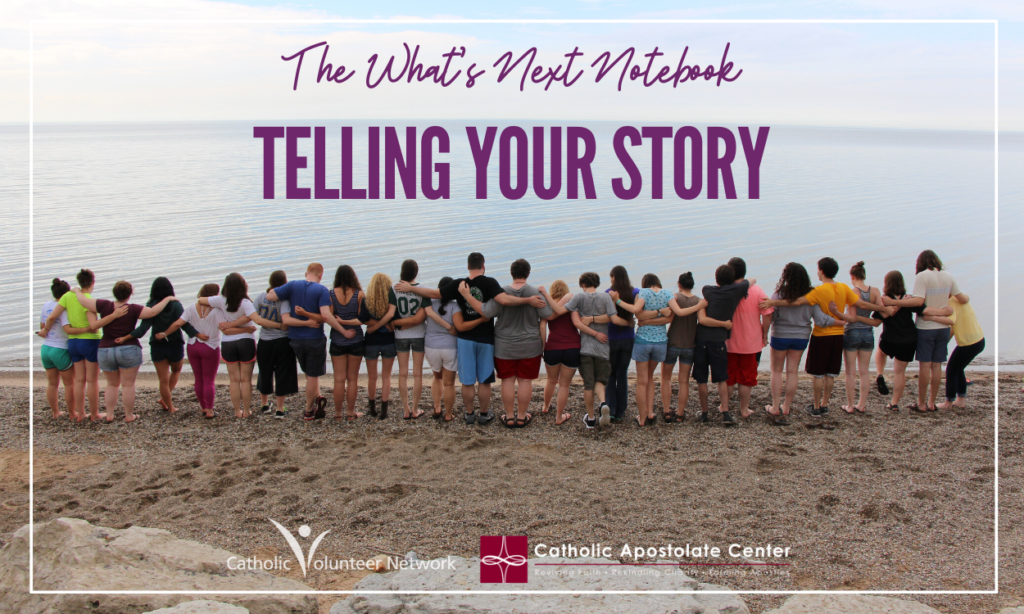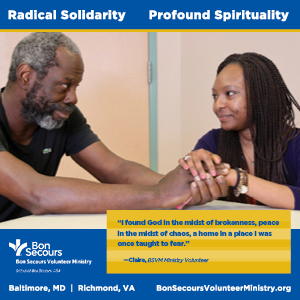This blog is part of our #WhatsNext series for former volunteers, inspired by the What’s Next Notebook resource from Catholic Volunteer Network and Catholic Apostolate Center. In each blog, we will explore helpful tips for looking back on your volunteer experience, saying goodbye, determining your next steps, and sustaining your spiritual growth during the transition to “life after volunteering.”
“How was it?”
“How was it?” It won’t take long for you to hear this question after you return home. It is difficult to know how to summarize such a complex and life changing experience in only a few sentences. Most people will not have the patience to listen to your full story, so how can you respond to this question?
Tips for Telling Your Story
Connect with someone who speaks your language. Do you have a friend or acquaintance who has a volunteer or mission experience also? It might be helpful to speak with them soon after your arrival home. They will probably make more time to listen to your stories than others who cannot relate. You will find it therapeutic to “get it all out” and after that experience, you will find it easier to share your story in a more concise way.
Say ‘Yes!” to story-sharing opportunities! You may be asked to write or speak about your experience by your parish, your alma mater, or even your volunteer program. Although it may seem daunting, the chance to reach a captive audience, with time to prepare your talking points, is a great opportunity to continue the work you began during your year of service. If you are unsure of where to start, here are some suggestions that may be helpful depending on your audience (and whether you are writing or speaking in-person).
- Preparation is key. Giving a talk or virtual presentation? Considering how well you know your own stories, you may feel inclined to wing it rather than prepare your talk, but we encourage you to spend some time thinking through your talk in advance. It is easy to get carried away with story after story and you may lose your audience in the process. Jotting down a simple outline will help you stay on track, but also speak naturally.
- Introduction. Writing about your experience? Start by sharing your name and where you are from, what program you volunteered with, and where you have served. Briefly describe what you did there. Tip: Many times as volunteers we get engaged in a number of different ministries – don’t waste too much time in the introduction describing all of them. Instead, focus on one or two that were most significant to you, and to this audience.
- Use stories to illustrate your ministry. Rather than talking about the people you served in a broad terms, focus in on one or two stories that really explain what your service was all about. Tip: Use first names whenever possible—this will naturally make your story more memorable.
- Describe the unique culture of the community you served. But, it is important to not dwell too much on the differences in culture, instead place great emphasis on the similarities you discovered. This will help the audience identify with the community you are describing.
- If you were to capsulate the experience in an image, scriptural passage, poetry, or metaphor – what would that be? Tip: try to choose something snappy and memorable – give the listeners something that will stick with them.
- Now that you’ve got their interest, be sure to let them know how they can get involved. Share some suggestions of ways they can partake in that ministry, or find a volunteer program to serve with. Don’t forget to mention Catholic Volunteer Network as a resource for those that would like to serve!
It’s never too late! Your service experience will stay with you for the rest of your life. There is no reason to stop talking about it after a year or two has passed. As time goes by, you will find that your stories change and take on new meaning. Audiences will be interested in hearing not only what the experience was like, but also how it changed you. Speaking engagements and written reflections are great opportunities for ongoing integration.
“I must tell my story if it is to become my story. In the telling of my experiences through the images and words related to those experiences I begin to own the experiences and allow them to shape me. In the telling of my story I appropriate the person I am becoming as a result of that story.” – John Welch, O. Carmelite
Thank you for diving into our #WhatsNext series! Next week, we will explore the theme of Discernment, in which we will discuss tips for choosing between the different paths before you. If you’ve enjoyed this blog, you can download the entire What’s Next Notebook by clicking here.
Read more blogs in this series by visiting our blog and clicking the #WhatsNext icon!
Be sure to register and receive all our resources for former volunteers, including the What’s Next Notebook and our Weekly Job Bank, by clicking here!





 Thousands of faith-based service opportunities can be at your fingertips with the RESPONSE. Download the latest edition today!
Thousands of faith-based service opportunities can be at your fingertips with the RESPONSE. Download the latest edition today!
